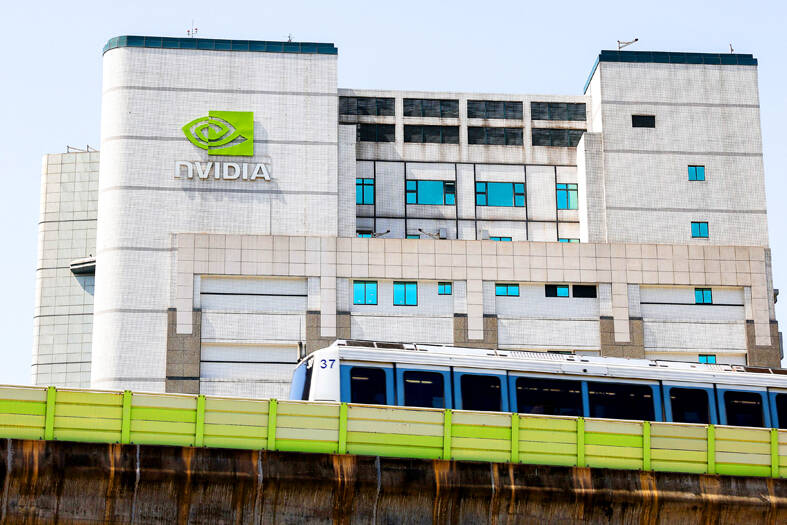US President Donald Trump’s administration has barred Nvidia Corp from selling its H20 chip in China, an escalation of Washington’s technology battle with Beijing that the company said would cost it billions of dollars and hamstring a product line it explicitly designed to comply with previous US curbs.
The US government on Monday informed Nvidia that the H20 would require a license to export to China “for the indefinite future.”
The rules address Washington’s concerns that “the covered products may be used in, or diverted to, a supercomputer in China,” the company said in a filing on Tuesday.

Photo: Ann Wang, Reuters
Nvidia said it would report about US$5.5 billion in write-downs during the current quarter, tied to inventory and commitments for the chip.
Nvidia’s shares yesterday fell 5.8 percent in premarket trading, while shares in rival chipmaker Advanced Micro Devices Inc (AMD) dropped 6.5 percent.
Asian tech giants also saw big declines. Taiwan Semiconductor Manufacturing Co (TSMC, 台積電) dropped 2.51 percent in Taipei, and testing equipment maker Advantest Co’s shares fell 6.7 percent and Disco Corp lost 7.6 percent in Tokyo. South Korean chipmakers Samsung Electronics Co and SK Hynix Inc were down by about 3 percent.
“An increase in US-China trade tensions prompted investors in the region to dump their stocks,” Moore Securities Investment Consulting Co (摩爾投顧) analyst Adam Lin (林漢偉) said, referring to the latest US Department of Commerce actions to impose export restrictions on Nvidia’s H20 and AMD’s MI308 chips, which are critical to artificial intelligence (AI) development.
“TSMC also remained concerned by the Trump administration’s threat to tariff semiconductors,” Lin said.
The new restrictions are among the clearest signs yet that Trump would stay the course on Washington’s efforts to limit China’s semiconductor and AI ambitions.
US officials first barred Nvidia and other AI chipmakers from selling their most advanced models to China in October 2022, over concerns that the technology could give Beijing a military edge. Since then, the China controls have ballooned to include an increasingly large set of semiconductor manufacturing tools, as well as a wider range of processors and high-bandwidth memory chips, which are essential for AI applications.
The news of the new controls came after US Senator Elizabeth Warren urged US Secretary of Commerce Howard Lutnick to impose restrictions on exports of Nvidia’s H20 and other advanced AI chips to China.
“I write with great concern regarding reports that the Commerce Department has paused its plan to restrict the export of powerful advanced AI chips like Nvidia’s H20 to the People’s Republic of China,” Warren wrote in a letter posted on the Web site of the US Senate’s Committee on Banking, Housing and Urban Affairs.
Former US president Joe Biden had not included the H20 chips in controls his administration placed on exports of advanced AI chips, it said.
The restrictions follow Nvidia’s announcement on Monday that it would build up to US$500 billion of AI infrastructure in the US over the next four years.
Additional reporting by CNA and AP

TAKING STOCK: A Taiwanese cookware firm in Vietnam urged customers to assess inventory or place orders early so shipments can reach the US while tariffs are paused Taiwanese businesses in Vietnam are exploring alternatives after the White House imposed a 46 percent import duty on Vietnamese goods, following US President Donald Trump’s announcement of “reciprocal” tariffs on the US’ trading partners. Lo Shih-liang (羅世良), chairman of Brico Industry Co (裕茂工業), a Taiwanese company that manufactures cast iron cookware and stove components in Vietnam, said that more than 40 percent of his business was tied to the US market, describing the constant US policy shifts as an emotional roller coaster. “I work during the day and stay up all night watching the news. I’ve been following US news until 3am

UNCERTAINTY: Innolux activated a stringent supply chain management mechanism, as it did during the COVID-19 pandemic, to ensure optimal inventory levels for customers Flat-panel display makers AUO Corp (友達) and Innolux Corp (群創) yesterday said that about 12 to 20 percent of their display business is at risk of potential US tariffs and that they would relocate production or shipment destinations to mitigate the levies’ effects. US tariffs would have a direct impact of US$200 million on AUO’s revenue, company chairman Paul Peng (彭雙浪) told reporters on the sidelines of the Touch Taiwan trade show in Taipei yesterday. That would make up about 12 percent of the company’s overall revenue. To cope with the tariff uncertainty, AUO plans to allocate its production to manufacturing facilities in

Six years ago, LVMH’s billionaire CEO Bernard Arnault and US President Donald Trump cut the blue ribbon on a factory in rural Texas that would make designer handbags for Louis Vuitton, one of the world’s best-known luxury brands. However, since the high-profile opening, the factory has faced a host of problems limiting production, 11 former Louis Vuitton employees said. The site has consistently ranked among the worst-performing for Louis Vuitton globally, “significantly” underperforming other facilities, said three former Louis Vuitton workers and a senior industry source, who cited internal rankings shared with staff. The plant’s problems — which have not

COLLABORATION: Given Taiwan’s key position in global supply chains, the US firm is discussing strategies with local partners and clients to deal with global uncertainties Advanced Micro Devices Inc (AMD) yesterday said it is meeting with local ecosystem partners, including Taiwan Semiconductor Manufacturing Co (TSMC, 台積電), to discuss strategies, including long-term manufacturing, to navigate uncertainties such as US tariffs, as Taiwan occupies an important position in global supply chains. AMD chief executive officer Lisa Su (蘇姿丰) told reporters that Taiwan is an important part of the chip designer’s ecosystem and she is discussing with partners and customers in Taiwan to forge strong collaborations on different areas during this critical period. AMD has just become the first artificial-intelligence (AI) server chip customer of TSMC to utilize its advanced